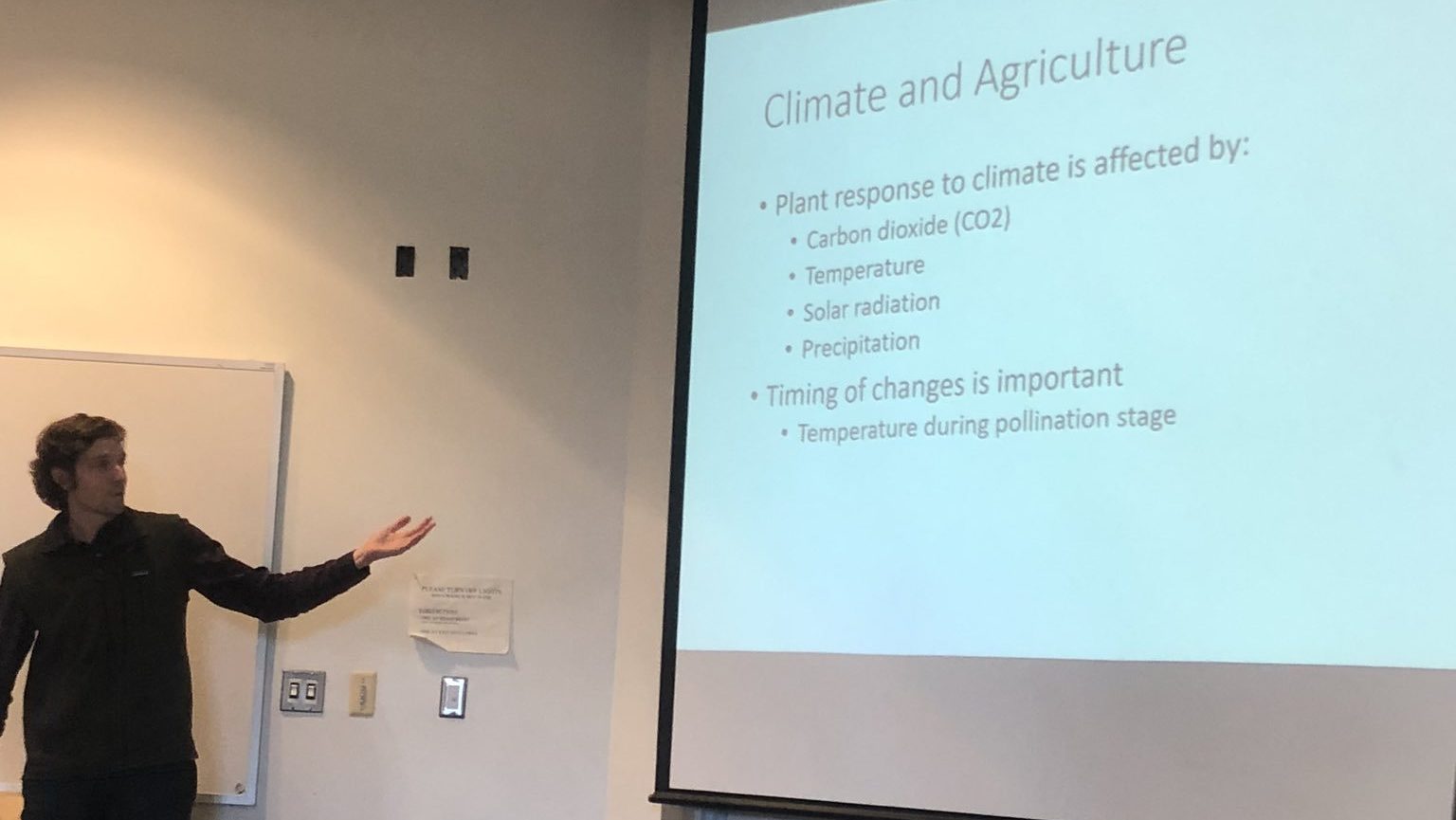Global Change Seminar: Global Change and Adaptation in Agriculture

This post was written by 2019-20 Global Change Fellow, Katie McQuillan, summarizing the final seminar in the fall Global Change Seminar series, Global Change and Adaptation in Agriculture, on December 5, 2019. The discussion was moderated by Global Change Fellow, Sam Flake.
View a recording of the presentations.

Panelists:
Dr. Robert Mera, NCSU Marine, Earth, and Atmospheric Sciences
Dr. Eric Edwards, NCSU Agriculture and Resource Economics
Dr. Kent Burkey, Crop and Soil Sciences
As climate change progresses, changing temperature and precipitation patterns combined with more frequent extreme weather events pose difficult challenges for agriculture. We have already started to feel the impacts of increased climate variability in the form of intense drought coupled with extreme heat, as well as flooding due to extreme precipitation, sea level rise, and hurricanes. Hurricanes Florence and Matthew resulted in huge damage to agriculture infrastructure, loss of livestock, and public health problems due to toxic waste runoff. Severe drought continues to pop up with increasing frequency, forcing farmers to spend more on water all while seeing less profit due to reduced crop yields. Unfortunately, this trend is expected to continue and worsen, especially as the impacts of climate change accelerate. For this reason, it has become crucially important to implement agriculture adaptation strategies which will sustain food production under a changing climate. At this third Global Change seminar we heard from three speakers detailing the impacts of climate change and potential agriculture adaptation strategies all the way from global impacts down to the crop cellular level.
Dr. Robert Mera from Marine, Earth and Atmospheric Sciences started the seminar discussing the progression of global change and extreme events. Spanning topics from sea level rise, extreme precipitation, hurricanes, extreme cold, and wildfires, Dr. Mera detailed how climate change impacts are connected and continuously evolving. Particular focus is paid to impacts to North Carolina, where we see sea level rise causing increased erosion, loss of wildlife habitat, and saltwater intrusion. Hurricane Florence, which hit North Carolina in 2018, hammered NC agriculture and resulted in major toxic waste spills and the loss of 3-4 million turkeys and chickens. Additionally, the shellfish industry took a major hit, with some farmers losing nearly their entire farms. Dr. Mera concluded his talk highlighting increasingly extreme climate variability, as states continue to experience record high and low temperatures, sometimes even within the same month. Understanding current and projected impacts is crucial to implementing effective climate adaptation strategies.
Next, we heard from Dr. Eric Edwards from Agriculture and Resource Economics about the impacts of climate change on NC agriculture and potential water adaptation strategies. As Dr. Edwards has previously given similar talks to NC agriculture producers, we gained additional insight into his science communication strategy with stakeholder groups. The big four crops, wheat, soy, corn and cotton, all display non-linear relationships between both yield and temperature and yield and precipitation. This poses increasing challenges as climate change forces regional temperature and precipitation patterns to shift, making certain crops unsuitable to grow in the altered climate. Dr. Edwards noted that NC is expected to be one of the biggest losers in agriculture damage under climate change, and highlighted the need to implement water adaptation strategies. Currently, 40% of NC agriculture requires drainage improvements and should strive to implement smart systems which avoid draining right before drought and absorb nutrient runoff to mitigate negative water quality impacts.
Our last speaker, Dr. Kent Burkey from Crop and Soil Sciences, discussed using a genetic approach for adapting crops to future climates with the overall mission of improving the environmental stress tolerance of crops. His group has worked for over a decade using controlled experiments to screen soybean and wheat germplasm for ozone and heat stress response to identify the sources of stress tolerance for breeding purposes. Ultimately, the goal is to move stress tolerant traits into elite cultivars, breeds known for their high yield, in order to produce breeds which are both stress tolerant and high yielding. Dr. Burkey highlighted the extensive genetic diversity for stress tolerance that exists in the germplasm collections of major crops, and the opportunity for plant geneticists and plant physiologists to work together to mine this diversity and create breeds able to withstand climate change stressors.
The interdisciplinary nature of the seminar, spanning Marine, Earth, and Atmospheric and Sciences, Crop and Soil Sciences, and Agriculture and Resource Economics, provided an enriching lens to view the multi-faceted approaches to tackling agriculture adaptation. The Global Change Fellows would like to thank those who attended the seminar online and in person; your participation continues to make these events distinctive and engaging. We look forward to the next seminar series coming in the spring semester!
- Categories:
